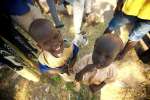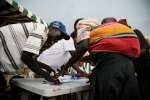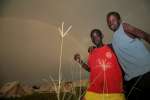- Text size
 |
|  |
|  |
| 
- Français
UNHCR and WFP seeks US$371 million for inter-agency operations to help South Sudan refugees
News Stories, 25 March 2014
GENEVA, March 25 (UNHCR) – Amid the worsening crisis in South Sudan, the UN refugee agency and the World Food Programme this week appealed on behalf of partners and themselves for US$371 million in urgently needed support for the thousands of South Sudanese refugees arriving in neighbouring countries.
Since fighting erupted in mid-December between government troops and rival forces more than 204,000 people have fled to Sudan, Uganda, Ethiopia and Kenya. With continuing insecurity and growing food shortages inside South Sudan, UNHCR expects the number of South Sudanese refugees across the region to reach 340,000 by the end of the year.
UNHCR spokesman Adrian Edwards said Tuesday in Geneva that South Sudanese have recently been fleeing into neighbouring countries at a rate of nearly 2,000 per day, with most heading to Ethiopia and Uganda. Many of the refugees have been arriving exhausted, nutritionally weak and in poor health, having coming from areas of South Sudan experiencing severe food shortages.
The majority are women, children and older people. With some 708,900 people displaced inside South Sudan and 3.7 million at high risk of food insecurity, the potential for further cross-border movement is high.
"Given these trends, the regional emergency response announced yesterday will focus on protection activities and other life-saving needs. These include emergency food, water, sanitation and health," said Edwards, adding that UNHCR "will be developing and expanding refugee camps and other sites where basic services will be available."
Monday's appeal covers only the South Sudanese refugee population in neighbouring countries. UNHCR's work to help internally displaced people and the 235,000 mainly Sudanese refugees inside South Sudan is covered by separate budgets.

















































